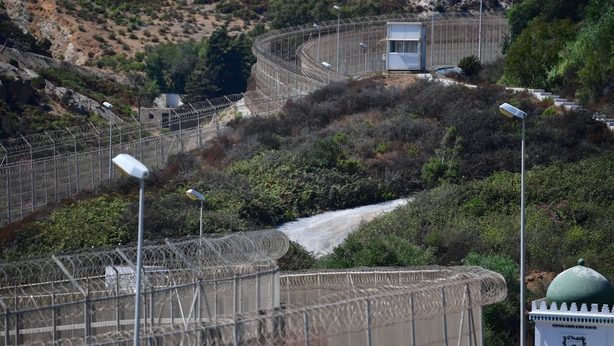The Italian Deputy Prime Minister has said that his party would vote to suspend funding to the European Union next year if other member states did not agree to take in a group of people being held on a coast guard ship in Sicily.
Three days after the Diciotti vessel docked in Catania, 150 adults remain on board.
After seeing hundreds of thousands of sea arrivals in recent years, Italy wants other EU countries to accept the migrants.
The European Commission has said repeatedly this week that it is working to find an agreement.
Other such deals were found in June and July for ships carrying rescued migrants that docked in both Italy and Malta.
"If tomorrow nothing comes out of a European Commission meeting on redistributing migrants from the Diciotti ship, the 5-Star and I will not be willing to give €20bn each year to the EU," Luigi Di Maio said in a video posted on Facebook.
He is the leader of the anti-establishment 5-Star Movement, which is in a coalition government with the Far-Right League and its leader, Matteo Salvini, who has championed a hardline against immigration since taking office in June.
Mr Di Maio said he agrees with Mr Salvini's position that the migrants should stay on the ship until there is an agreement in the EU.
Mr Salvini, who is also interior minister, is defiant in the face of a criminal probe into possible kidnapping charges for forcing the migrants to remain on the vessel.
The chief prosecutor from the Agrigento court, Luigi Patronaggio, boarded the Diciotti and said afterwards he had opened an investigation against "unknown" persons for holding the migrants against their will.
"There's a court that is investigating whether those illegally on board the ship have been kidnapped," Mr Salvini said in a radio interview.
"I'm not unknown. My name is Matteo Salvini ... I'm the Interior Minister and I think it is my duty to defend the security of this country's borders."
He allowed 27 unaccompanied minors off the ship yesterday.
Humanitarian groups - including the United Nations refugee agency, the International Organisation for Migration (IOM) and Medecins Sans Frontières - renewed calls for the migrants' release from the vessel.
Spain returns to Morocco migrants who stormed enclave fence
Meanwhile, Spain has sent back to Morocco 116 people who had stormed the border fence at its Ceuta enclave in North Africa, a Spanish Interior Ministry spokesman has said.
Hundreds of migrants had attempted to get over the highly fortified border yesterday, and 118 made it to Spanish soil.
Some of them threw a corrosive substance which left seven police officers with burns.
Police identified the entire group and gave them legal and medical help before starting the process of expelling them, which the migrants accepted, the spokesman said, adding two will be allowed to stay because they are minors.
The spokesman later added that the migrants had been informed that they had the right to request asylum in Spain, but none accepted the offer to start the process.

Amnesty International criticised the approach, saying in a statement: "Due to the speed at which it is carried out, it is difficult to guarantee access to a personalised procedure with full guarantees."
The group said that in the short time available it was difficult to provide good legal assistance and interpreters, and adequately identify potential asylum seekers.
Footage from local broadcaster Faro TV showed men being escorted by Spanish police and officials in green uniforms onto a bus which then crossed the border back into Morocco.
Five of the group were injured in the jump over the fence,which is topped with razor wire.
The footage showed two were visibly limping while another walked with crutches.
More than 3,800 migrants have crossed into Spain's territories on the Moroccan border so far this year, according to the United Nations refugee agency.
That accounts for 14% of the total who arrived, mainly by sea, in Spain, making it the main destination for people seeking a better life in Europe.
Morocco agreed to take back the people under an agreement which dates from 1992 and under which Morocco must readmit citizens of third countries who have entered Spain illegally, if Spain requests this within ten days of their arrival.
The spokesman said this provision has been used very rarely, and Morocco agreed to take them thanks to "good bilateral relations".
Previous Spanish governments have drawn criticism from human rights groups for allowing some migrants to be immediately turned back to Morocco without first seeking to identify them and offer assistance.
The rights groups argue that skipping the lengthier deportation procedures deprives people of the opportunity to claim asylum.
Last year, the European Court of Human Rights ruled that the immediate return of sub-Saharan migrants who attempted to cross the border into Melilla, the Spanish enclave east of Ceuta, amounted to a collective expulsion of foreign nationals and breached the European Convention on Human Rights.

